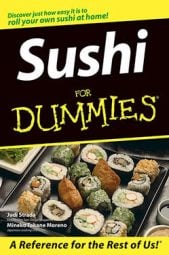Some of the ingredients you use in sushi need to be refrigerated — and not only the fresh, raw fish that you can use to create sushi magic. Look for these refrigerated sushi ingredients in your local Asian market:
Pickled ginger: Sweet and tart at the same time, sliced pickled ginger plays a major role in sushi. Look for naturally beige or pink pickled ginger, often called sweet pickled ginger, to eat as a condiment.
Wasabi paste and powder: Wasabi paste (made with wasabi powder or purchased in tubes) has a fresh, hot taste that complements and highlights the taste of raw seafood and all kinds of sushi.
Deep-fried tofu pouches: Puffy little squares or rectangles of golden fried tofu, usually sold two to four to a package in the refrigerated section of Japanese or Asian markets.
Barbecued unagi (freshwater eel): Butterflied, precooked glazed eels are sold in cellophane packages in the freezer section or fresh fish section of Japanese and Asian markets.
Kani kama (imitation cooked crabmeat): Usually made of cooked pollock (a white-fleshed, mild fish) and crab flavoring.
Miso: Miso (fermented soybean paste) is deeply rooted in Japanese cuisine. Miso comes in light and dark colors, and its taste varies from nutty to complex, from slightly salty to very salty. Its fragrance is a bit like ale.
Tofu: High-protein, lowfat soybean curd. Tofu is sold many different ways, including packed in water and vacuum-packed.
Quail eggs: Dainty, one-bite-sized quail eggs are such a kick to serve and eat! Japanese markets stock fresh quail eggs, usually ten to a 5-inch-long plastic package.

